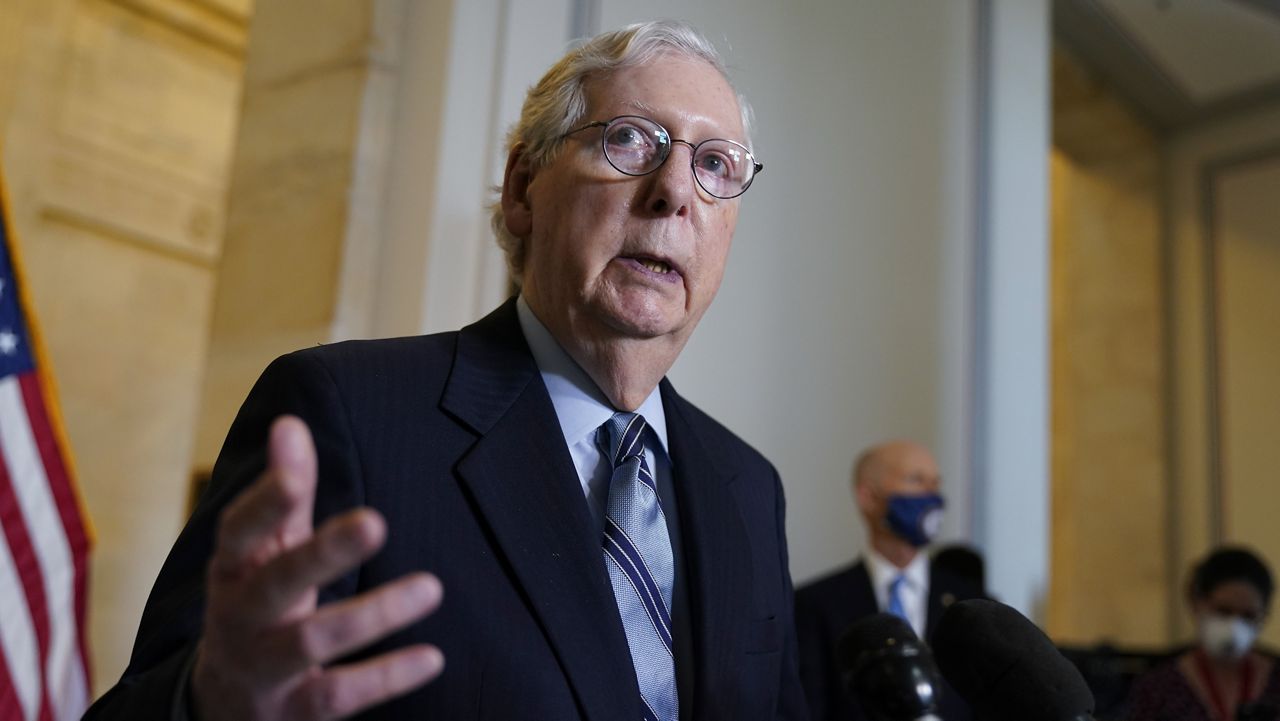With Congress back in session this week, much of the attention will be focused on President Joe Biden’s $4 trillion joint infrastructure proposals — the American Jobs Plan and the American Families Plan — with negotiations set to resume between Democrats and Republicans on the size and scope of those packages.
The president will have two key public meetings this week on infrastructure and spending, a Thursday sit-down with a group of Republican Senators, and the first Oval Office meeting with the “big four” of Congressional leadership — House Speaker Nancy Pelosi, Senate Majority Leader Chuck Schumer, House Minority Leader Kevin McCarthy, and Senate Minority Leader Mitch McConnell.
In an interview with Kentucky’s PBS station Kentucky Educational Television which aired Sunday, McConnell signaled a willingness to go up to $800 billion on infrastructure, a figure much higher than the $568 billion figure proposed by Senate Republicans led by West Virginia Sen. Shelly Moore Capito.
“The proper price tag for what most of us think of as infrastructure is about $600-800 billion,” McConnell said, noting that the president will need to focus on “traditional” infrastructure to gain Republican support — namely, items such as roads, bridges, public transit, railroads broadband and airports.
McConnell last week backed a plan in the range of $600 billion, and said that he did not think “there will be any Republican support” for Biden’s plan, which he slammed as a “$4.1 trillion grab bag which has infrastructure in it but a whole lot of other stuff.”
"We're open to doing a roughly $600 billion package which deals with what all of us agree is infrastructure," he said at the time. "If it's going to be about infrastructure, let's make it about infrastructure."
Biden’s $4 trillion plan is split into two pieces — about $2.3 trillion for traditional infrastructure, as well as funding for areas like the home health care industry, schools and child care facilities, and $1.8 trillion on what is referred to as “human infrastructure,” including free community college, universal preschool and a comprehensive paid leave program.
Biden highlighted the need for his infrastructure proposal last week in the deep-red state of Louisiana, pitching the bill in a state that has seen billions in damages from recent hurricanes.
The mayors of Lake Charles and Shreveport, a Republican and Democrat respectively, urged the passage of the infrastructure proposal in a joint op-ed.
“[The American Jobs Plan] repairs 10,000 bridges that desperately need to be upgraded. Bridges that get kids to school, people to market,” Biden said last Thursday. “When you build better roads, or extend the train line over to the next town, or install reliable high speed internet, it sparks new life and investment in communities.”
“It's hard to believe that you got hit as badly as you have within the time frame that you have,” Biden said of the storm damage, promising that his American Jobs Plan would not only build back the damaged infrastructure, but would do so “in a way that it has resilience.”
Sen. Capito’s counter-proposal calls for $299 billion for roads and bridges, $20 billion for railroads, $61 billion for public transit systems and $65 billion toward broadband infrastructure.
The two sides appear to be willing to negotiate on what the plan would pay for, but are far apart on how to pay for it. Democrats could negotiate with Republicans on a more targeted plan, then utilize the Senate budget reconciliation process to pass more of Biden's proposals.
Biden proposed paying for the American Jobs Plan by raising the corporate tax rate from 21% to 28% — which Republicans lowered from 35% via the 2017 tax reform legislation — and raising the taxes on the wealthiest Americans — namely households earning more than $400,000 per year — to fund the American Families Plan.
McConnell said last week all members of his caucus would oppose rolling back the 2017 tax reforms, one of the signature Republican legislative achievements of the last decade.
“We're not willing to pay for it by undoing the 2017 bill,” McConnell said last week.
On Sunday, he signaled a willingness to funding the package through more traditional means, such as an increase to the gas tax.
"The way to pay for infrastructure is through the gas tax that already exists, and the gap between that and what we're willing to spend here needs to be credibly paid for, and the best way to pay for infrastructure is with the people who use it," he said.
The White House said Monday that Biden will meet with Sens. Tom Carper, D-Del., and Joe Manchin, D-W.Va, on the American Jobs Plan and the ongoing Congressional negotiations on infrastructure.



